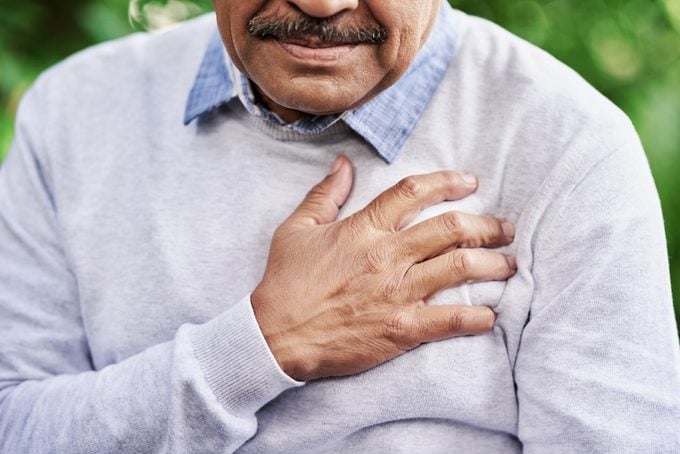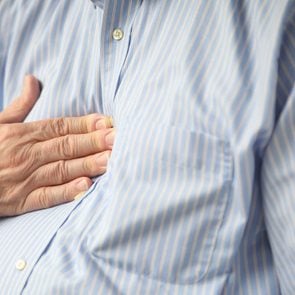8 Chest Pains You Might Mistake for a Heart Attack
Updated: Jun. 24, 2021
Identify the other causes of chest pain, from heartburn to pneumonia, to determine whether you're having a real or fake heart attack.
When you think of a heart attack, the first thing that comes to mind is chest pain. Although chest pain can be a sign of a heart attack, there are other causes of chest pain, which means you may be having a fake heart attack. Just remember it’s better to be safe than sorry: Any time you think you might be having a heart attack, call 911 right away.
If you want to know the difference between a real and a fake heart attack, you should pay attention to any other symptoms that accompany your chest pain. You should also be familiar with your medical history to see if there are any underlying conditions that can also trigger chest pain besides heart trouble. We spoke with an internist and cardiologist who offer their tips for identifying the other causes of chest pain to help you determine whether you’re having a real or fake heart attack.
You have heartburn
Severe heartburn symptoms have been behind many a fake heart attack. They can definitely cause you to panic—again, if you have any doubt, call 911. If, however, you aren’t at risk for a heart attack, and you have reason to believe the pain you’re experiencing is from acid in your esophagus, try taking an antacid. This should soothe the burning pain of indigestion. Monitor your diet and limit or stop eating these foods and drinks that can trigger heartburn or make it worse.
You have a case of shingles
Another possible cause of chest pain that may mimic a heart attack is shingles, says Kristine Arthur, MD, an internist with MemorialCare Medical Group in Fountain Valley, California. Shingles, which are a resurgence of the chickenpox virus in the body, can cause severe pain that radiates around one side of the rib cage. Usually, there is a significant rash too. However, in some cases, it’s so small you may not see it. “You should suspect shingles if the pain follows the line of a rib and if there are any type of skin changes along the area that hurt,” says Dr. Arthur. “It is almost always only on one side.” (Don’t miss what right-side chest pain could mean.)
You have pancreatitis
Typically, pancreatitis—inflammation of the pancreas, a long flat gland behind the stomach—causes abdominal pain, but the pain can radiate into the chest, causing you to think it’s heart-related, according to the National Institute of Diabetes and Digestive and Kidney Diseases. You’ll need a medical workup to determine the cause of the pain, as blood work and medical imaging can help your doctor make the proper diagnosis. ( Here are silent signs it could be pancreatic cancer.)
 You’re having a panic attack
You’re having a panic attack
Tightening of the chest, heart palpitations, sweaty palms, lightheadedness—these are all symptoms of a heart attack. They’re also symptoms of a panic attack. If you experience panic disorders, ask your doctor to evaluate your heart health, so that the next time a panic attack occurs, you’ll know what to do. If you have any doubt during such an attack, go to the emergency room.
You have costochondritis
Another possible cause of chest pain: costochondritis, inflammation of the cartilage that connects ribs to your breastbone. “The pain can be very sharp and hurt if you take a deep breath,” says Dr. Arthur. “Although it can be present on both sides, it is usually worse on one side.”A good way to tell if your chest pain may be costochondritis: lift your arms above your head and see if the pain improves. During a heart attack, you will be in pain regardless of motion.
Your muscles are sore
Chronic pain syndromes, such as fibromyalgia, can cause the kind of muscle-related chest pain that’s easy to mistake for a heart attack. Symptoms vary, but many people report intense, sharp, or stabbing pain in the chest and ribcage. When fibromyalgia causes inflammation of the cartilage that joins the upper ribs to the breastbone, it results in costochondritis.
You have pneumonia
Lung issues, such as pneumonia, may also mimic heart attack symptoms. The fluid build up in your lungs’ air sacs “can cause chest pain and pressure, which causes people to think [they’re having a] heart attack,” says Nicole Weinberg, MD, a cardiologist at Pacific Heart Institute in Santa Monica, California. Dr. Weinberg recommends seeking medical attention from a cardiologist first and foremost; having a workup of the heart can be helpful in addressing lung issues, as well.
You have stomach ulcers
Because pain can radiate from the stomach to the chest, the pain of stomach ulcers may manifest as chest pain. “Anything from the mouth down to the stomach can be the cause of chest pains,” Dr. Weinberg says. You’ll need to be evaluated by your physician to determine whether or not your chest pains are from ulcers, but if you have a history of stomach ulcers, this is a likely cause.























